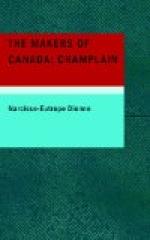Soon after his arrival at Quebec, Champlain set out for the falls, accompanied by Father Jamet. They reached the river des Prairies some days after, and on June 24th, Father Jamet celebrated a solemn mass, at which Champlain and some others assisted. This was the first mass celebrated in Canada since the days of Jacques Cartier.
In the early days of the settlement these brave missionaries had to contend with many difficulties, which could be foreseen only by those who were acquainted with the existing state of affairs. Many of these difficulties arose from the fact that at least a fourth of the merchants of the company were members of the so-called reformed, or Calvinistic persuasion. It is easy to comprehend that the sympathies of these men would not incline towards the Catholic religion.
Champlain draws particular attention to the unfortunate results produced by the existence of different creeds. Differences arose, and divisions were created which sometimes resulted in quarrels between children of the same country. These quarrels which were much to be deplored, did not, however, occur in Quebec, because the French merchants did not deem it advisable to send their ministers there, but replaced them by agents who were often fanatical, and were for the Recollets a frequent source of bitterness and annoyance. The most of the disorders occurred on board the vessels, and were due to the fact that the crews were too hastily engaged.
The merchants, however, were bound to colonize the country with Catholic settlers, and de Monts was also bound by similar conditions. Moreover, the terms of the patents expressly stipulated that this should be carried out. They were also forbidden to extend Calvinism among the savages. “This policy,” says Bancroft, “was full of wisdom.” The interpreters who could have greatly assisted the missionaries, proved on the contrary an obstacle to the development of the Catholic religion, for they refused to instruct the Recollets in the Indian languages, which they had learnt before the arrival of the missionaries.
Father Lalemant, a Jesuit, wrote in the year 1626: “This interpreter had never wanted to communicate his knowledge of the language to any one, not even to the Reverend Recollet Fathers, who had constantly importuned him for ten years.” So also wrote Father Le Jeune in his Relation of 1633.
The difficulties that the missionaries had to overcome are therefore readily understood. However they had the merit of preparing the way for their successors, and the honour of planting the cross of Jesus Christ everywhere, from Tadousac to Lake Huron.
The number of missionaries was limited at the commencement, but some others came to Canada later, particularly Fathers Guillaume Poullain, Georges Le Baillif, and Paul Huet. These men, some of whom were of noble birth, were remarkable for their virtues and their abilities. In the annals of the primitive church of New France, their names are illustrious, and around their memory gathers the aureole of sanctity. During six years, from 1615 to 1621, the spiritual direction of the colony was entrusted to six fathers and three friars. Father d’Olbeau remained in charge of the habitation of Quebec, and Father Le Caron resolved to proceed at once to the country of the Hurons.




